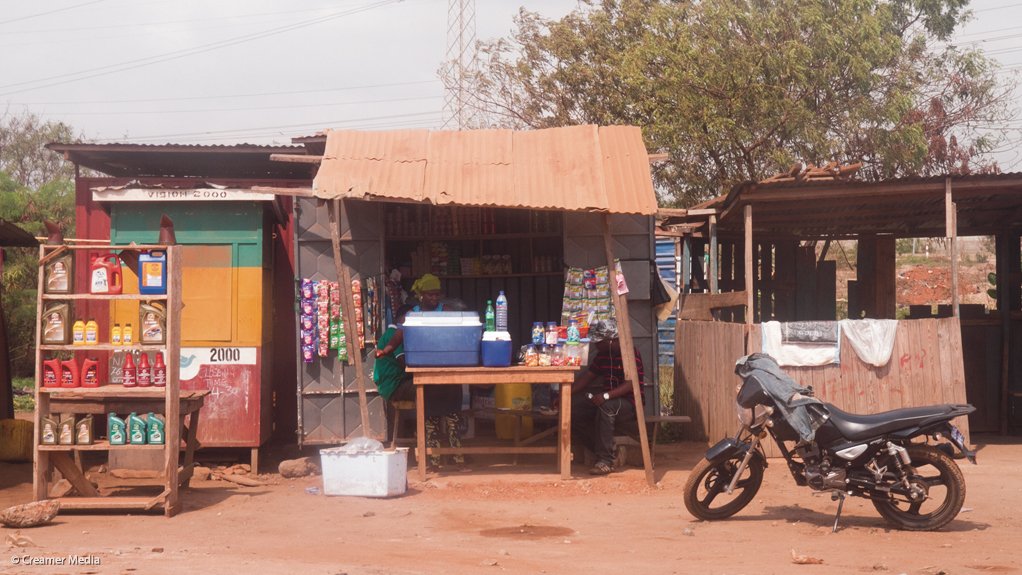In this corner of South Africa's black township of Soweto, the biggest building used to be the Catholic church. Now it's been overshadowed by a shopping centre and business has only gotten worse for Grace, a 68-year-old shopowner.
Like many proprietors of spaza shops - the informal stores that dot township corners - Grace barely manages to keep afloat as more of her neighbours head to the mall.
"Once people get paid, they buy their groceries at the malls," she said, sitting among dusty shelves of tea-bags, small packets of biscuits, loose cigarettes and butter.
"They used to buy their groceries from us. Now they only come for daily items," she said, declining to give her last name.
Grace has been running the shop with her husband since 1993, the year before South Africa's first all-race elections. They used to earn around R1 500 ($140) a day, but are down to a third of that now.
During apartheid, blacks were crammed together in squalid townships miles away from cities. Some residents began to sell staples such as maize meal and cooking oil out of their own homes. The informal stores became known as tuck shops or spazas, a slang word that connotes just getting by.
Along with shebeens, or corner taverns, spazas are one of the most visible parts of township life, and a major component of South Africa's vast informal economy.
While recent data on the informal economy is hard to come by, a 2002 study by the University of South Africa's Bureau of Market Research (BMR) estimated that spaza shops brought in around $705-million a year, employing up to 290 000 people.
Those numbers will have come under pressure over the last decade as real estate developers and big grocers such as Shoprite and Pick N Pay push into black areas, targeting rising consumer spending.
GETTING THE CAKE
South Africa's emerging black middle class grew at annual 6.5% between 2001 and 2007, according to the BMR, which estimated the growing socioeconomic group at 9.3-million in 2007, out of a total population of around 50-million.
"The emerging consumer market has been very, very good for construction of retail outlets in non-traditional locations," said Mike Upton, chief executive of South African building company Group Five.
"It's kind of like first mover gets the cake."
Grocers have been big beneficiaries of this broadening wealth.
Shares of Shoprite, Africa's top retailer, have more than trebled over the last five years, lifted by a push into sub-Saharan Africa and previously underserved South African markets. The Cape Town-based company's no-frills Usave discount outlets pose a major threat to spaza shops.
The warehouse-like stores appear tailor-made for low-income customers: most of the laundry soap is for hand washing, not machines. Some dispense with large parking areas as customers come on foot.
The only milk available is full cream - no skim, organic or soy - while bags of frozen walkie talkies - chicken heads and feet - are plentiful and cost just R10.
In Soweto, a flashpoint of the anti-apartheid struggle, where stone-throwing black youths battled heavily armed soldiers and police with their snarling dogs, the 65 000-square-metre Maponya Mall is one of several shopping centres that have sprung up in recent years.
Just down the road from Regina Mundi church where former President Nelson Mandela is depicted in stained glass, the mall boasts a Pick 'n Pay hypermarket, more than a dozen restaurants and a Virgin Active gym.
Although still poor, Soweto is unmistakably on the rise, evidenced by the growing number of tidy brick bungalows and shiny Toyotas, and even the odd BMW.
While recent data is not available, Rose Nkosi, the head of the South African Spaza and Tuckshop Association, reckons that the sprawling black township alone may have lost around 30% of its spaza shops since 2005.
That's bad news for the elderly or those who live far from a shopping centre, Nkosi said.
"Spazas are community shops," she said, pointing out they sell in small amounts, such as half loaves of bread, to meet the needs of the poorest customers.
ECONOMIES OF SCALE
The big retailers are able to use economies of scale to undercut spazas, which usually buy in small volumes and from wholesalers, driving up costs.
Nkosi has teamed up Songi Pama, an entrepreneur and consultant, to bring spaza shop owners together to buy direct from suppliers such as South Africa's Tiger Brands and the local units of Unilever and Nestle.
The survival of spazas is critical to the fabric of the townships because so many of the owners are women, Pama said.
"The little that they get out of these outlets they use to feed their children and take their children to school."
Too few owners are real businesspeople, said Noel Ndhlovu, who publishes industry newsletter Spaza News. Most are just looking to make enough get by, he said.
"Unfortunately, the bulk of spaza shops, about 60% or 70%, are survivalists. And because they are survivalists, they don't have skills - no business skills, no financial literacy, nothing."
In one workshop he ran, Ndhlovu said it took him several sessions to get some of the owners to understand how to work out their gross and net profit.
Not far from Grace, middle-aged Vincent Jonyane leans out the window of his tin-roof shop and laughs. Business is good, he says. While elderly rivals are stuck in the past, he is thinking of expanding his wooden shack.
"I'm still young, I know where to buy things cheap," Jonyane said, pointing to stacks of eggs in cardboard cartons on a shelf.
Even the malls do not worry him.
"You can't buy one egg at the mall. I sell one egg."
EMAIL THIS ARTICLE SAVE THIS ARTICLE
To subscribe email subscriptions@creamermedia.co.za or click here
To advertise email advertising@creamermedia.co.za or click here











